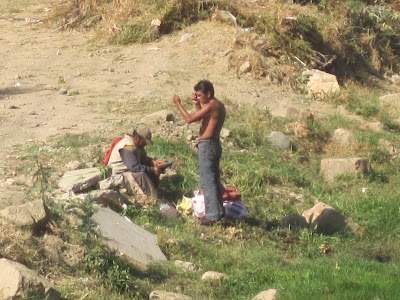Thoughts you have when you are leaving
Sarah mentioned to me that I needed to buy some toilet paper today. The mundane nature of that task combined with the year in South America coming to an end (and possibly the influence of watching the first 20 minutes of 2012 last night) got me thinking about the toilet and its place in our life.

But first some background: Travelers
Ask any traveler and they will concur. It happens about ten minutes after a group of them sit down together. They will start going through the motions (pun intended); relating what they have been doing and where they are going next. Then something else happens. Without noticing 45 minutes will have passed and the group will have only just started to realize they have, unabatedly, talked about feces and piss that entire time.
The script for talking about your own excrement normally follows along the following lines:
- The psychological trauma of having severe diarrhea for more than a week
- The profundity of having a solid shit after two weeks of diarrhea
- The worst toilet you ever encountered and had to use (AKA “Excuse to Let People Know You Were in South East Asia Once”)
- The most exposed place you ever had to relieve yourself in
- “This one time on the bus”
- And finally, a half hour digression about how you cannot believe you have just talked about your own piss and shit for so long…
This is a typical meet-and-greet traveler’s conversation. I would not blame anyone thinking that this is either a “tall story” or on the other end of the spectrum “typical, puerile and tedious”. Only the latter is true. It is what it is.
Back to Sarah’s request: What doesn’t seem to get talked about
The first custom you have to get used to in Latin America is throwing you toilet paper in the bin next to the bowl instead of in it (apparently the pipes just cannot handle the excess waste). This is more difficult to do than you might first imagine for three reasons.
The first is that you do not realize how programmed to the practice of ripping, wiping and dropping. Initially you believe that you will stick with your own custom because not flushing it seems unhygienic. Then you start realize that dropping it might lead to the cubicle being flooded with water from a full bowl so you don’t take the risk. The third hurdle to get over is the simple fact that it is reflexive to drop it in the bowl. One of the weirdest conversations you have with yourself in Latin American (after having accidently dropped some paper in the bowl) is “do I pick up that up to avoid the embarrassment of making an unwanted mess here or do I hope like crazy that this thing goes down”. Outside you hear waiters rushing around and a car murmur past the building but there you are, squinting, still wondering what to do.

Anyway. You eventually get used to sitting next to basket of other peoples shit-smeared toilet paper and its presence barely causes you to flinch. It is what happens next that is fascinating to me.
After you drop your paper in the basket you stand up and then lean over to the cistern and flush. Through this act of flushing you naturally glance at the waste. This was the thought that struck me this morning when Sarah she asked me to go to the store. For all my life I have never really looked at my own feces. Now, in September of 2010 in Bolivia, Cochabamba I realize I have, everyday (more or less) for ten months been looking at my own shit. Back home this was not even an issue. It was always covered with the discarded paper.
Something for the marketing team
We travel the world to see new things and experience new cultures. And to not have to work. Maybe this isn’t Machu Picchu but I assert that this is one of the most unexpected and interesting views going. Nothing puts you in touch with your own eating patterns, habits and general health than looking at your fresh turd floating in the bowl. Have I gotten accustomed to this? I really don’t know. But the thing that strikes me about this is that while this is not the Galápagos Islands it is something cultural that I can take home with me. Not a photo, not a colloquialism and not souvenir from a shop.




































